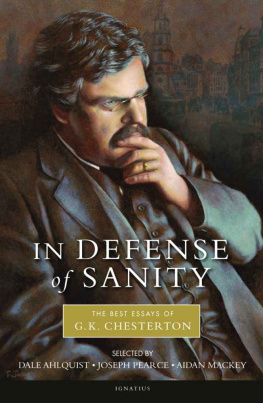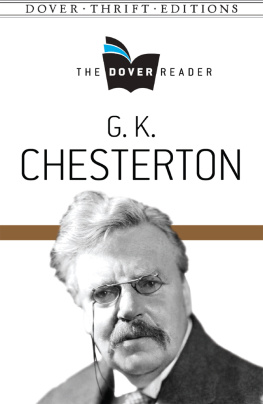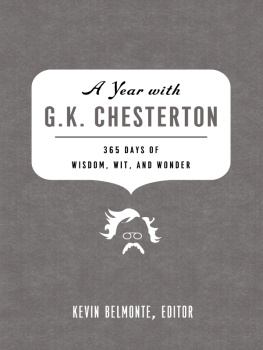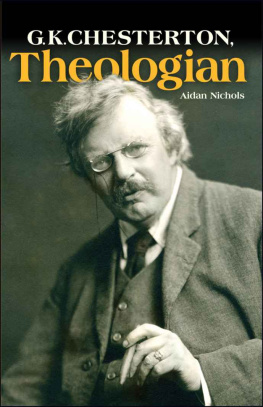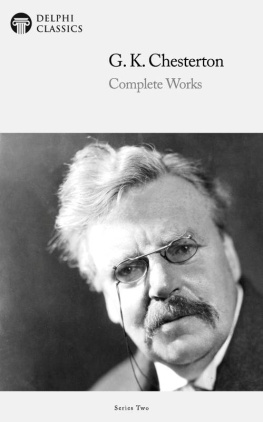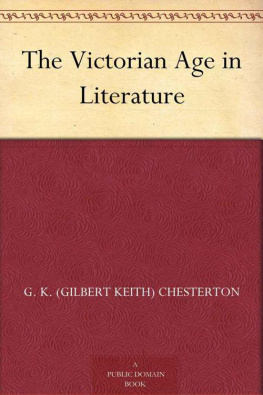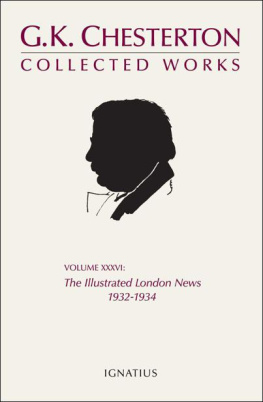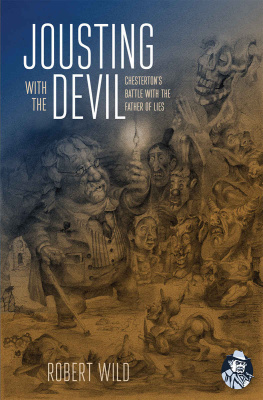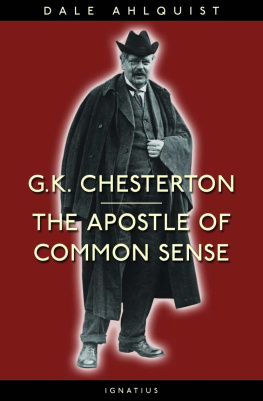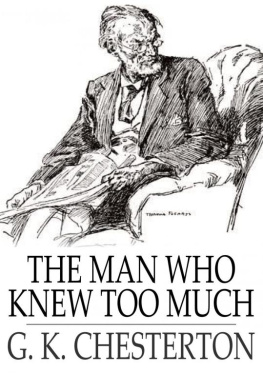Chesterton G. K. - The Soul of Wit: G. K. Chesterton on William Shakespeare
Here you can read online Chesterton G. K. - The Soul of Wit: G. K. Chesterton on William Shakespeare full text of the book (entire story) in english for free. Download pdf and epub, get meaning, cover and reviews about this ebook. year: 2013, publisher: Dover Publications, genre: Science. Description of the work, (preface) as well as reviews are available. Best literature library LitArk.com created for fans of good reading and offers a wide selection of genres:
Romance novel
Science fiction
Adventure
Detective
Science
History
Home and family
Prose
Art
Politics
Computer
Non-fiction
Religion
Business
Children
Humor
Choose a favorite category and find really read worthwhile books. Enjoy immersion in the world of imagination, feel the emotions of the characters or learn something new for yourself, make an fascinating discovery.
- Book:The Soul of Wit: G. K. Chesterton on William Shakespeare
- Author:
- Publisher:Dover Publications
- Genre:
- Year:2013
- Rating:4 / 5
- Favourites:Add to favourites
- Your mark:
- 80
- 1
- 2
- 3
- 4
- 5
The Soul of Wit: G. K. Chesterton on William Shakespeare: summary, description and annotation
We offer to read an annotation, description, summary or preface (depends on what the author of the book "The Soul of Wit: G. K. Chesterton on William Shakespeare" wrote himself). If you haven't found the necessary information about the book — write in the comments, we will try to find it.
The Soul of Wit: G. K. Chesterton on William Shakespeare — read online for free the complete book (whole text) full work
Below is the text of the book, divided by pages. System saving the place of the last page read, allows you to conveniently read the book "The Soul of Wit: G. K. Chesterton on William Shakespeare" online for free, without having to search again every time where you left off. Put a bookmark, and you can go to the page where you finished reading at any time.
Font size:
Interval:
Bookmark:
The Soul of Wit
G. K. Chesterton on William Shakespeare
G. K. CHESTERTON
Edited and with an Introduction by
Dale Ahlquist
DOVER PUBLICATIONS, INC.
Mineola, New York
Copyright
Copyright 2012 by Dover Publications, Inc.
Introduction copyright 2012 by Dale Ahlquist
All rights reserved.
Bibliographical Note
The Soul of Wit: G. K. Chesterton on William Shakespeare, first published by Dover Publications, Inc., in 2012, is a new compilation edited, and with an Introduction by, Dale Ahlquist. Inconsistencies in the text (such as spelling and punctuation), which have been retained, reflect the wide variety of source material.
Library of Congress Cataloging-in-Publication Data
Chesterton, G. K. (Gilbert Keith), 18741936.
The soul of wit : G. K. Chesterton on William Shakespeare / edited and with an introduction by Dale Ahlquist.
p. cm.
A new compilation edited, and with an introduction, by Dale Ahlquist. Inconsistencies in the text (such as spelling and punctuation), which have been retained, reflect the wide variety of source materialT.p. verso.
ISBN-13: 978-0-486-48919-3
ISBN-10: 0-486-48919-1
1. Shakespeare, William, 15641616Criticism and interpretation. I. Ahlquist, Dale. II. Title. III. Title: Chesterton on William Shakespeare.
PR2899.C473 2012
822.3.3dc23
2012019699
Manufactured in the United States by Courier Corporation
48919101
www.doverpublications.com
CONTENTS
Dale Ahlquist
I n his Autobiography, G. K. Chesterton paints the following early memory:
My father knew all his English literature backwards, and I knew a great deal of it by heart, long before I could really get it into my head. I knew pages of Shakespeares blank verse without a notion of the meaning of most of it; which is perhaps the right way to begin to appreciate verse. And it is also recorded of me that, at the age of six or seven, I tumbled down in the street in the act of excitedly reciting the words,
Good Hamlet, cast this nighted colour off,
And let thine eye look like a friend on Denmark,
Do not for ever with thy veild lids
Seek for thy noble father in the dust,
at which appropriate moment I pitched forward on my nose.
This amusing passage reveals that Chesterton enjoyed a lifelong relationship with Shakespeare. It was a relationship that was scheduled to continue in print, as Chesterton had been commissioned to write a book on Shakespeare after completing the Autobiography. Unfortunately, the Autobiography was the last book he wrote. He poetically completed his life in the flesh only a few weeks after completing it on paper.
Anyone familiar with Chestertons exquisite literary criticism is pained by the thought that he did not live long enough to write that promised book on Shakespeare. Each of his books on other literary figuresDickens, Browning, Stevenson, Chaucer, St. Thomas Aquinashas been praised by experts on those authors as the best work ever written on that subject. Chesterton always combines a profound insight with an unbelievably wide knowledge, an unfailingly fresh perspective and simply dazzling prose. The book on Shakespeare might have been his greatest book if only he had written it.
But perhaps it was not lost to us after all. Perhaps he did write the book on Shakespeare. Among the thousands of essays that Chesterton churned out over his thirty-six-year career are several devoted to Shakespeares plays and characters and criticisms. Just over two dozen of those essays were collected by Chestertons secretary and literary executrix, Dorothy Collins, who put them in a book called Chesterton on Shakespeare. But only a few copies were printed by a small, obscure press in the 1970s, which were the dark ages in terms of interest in Chesterton. Most of his books were out of print at that point, and his popularity was at an all-time low. It is a book that almost no one has read.
There has since been a wonderful revival of interest in Chesterton, thanks in no small part to our colleges and universities. As his books have returned to print, even scholars are starting to take notice. Not lost on them is the fact that Chestertons one hundred or so books represent only a fraction of what he wrote. There is more material to be mined among his uncollected writings that first appeared in newspapers and magazines. Much more. Enough for many more books.
I have had the pleasure of attempting to complete the task promised by Chesterton and started by his secretary: the book on Shakespeare. I am sure more good bits of Chestertons criticism on Shakespeare will still turn up. But here is the most complete collection that you can expect to see for a while. It has at least fifty percent more material than Dorothy Collins first go-round, drawn from over one hundred additional sources, spanning Chestertons entire literary career. There are references to at least thirty of Shakespeares thirty-seven plays. Interestingly, he talks more about Richard II than Richard III, talks more about Falstaff than any of the kings. There are references to Cymbeline but none to The Taming of the Shrew. And Hamlet gets the most attention, as well he should.
Some of these essays and excerpts have been buried for a long time. It was fun to dig these up. I am especially grateful to Geir Hasnes, who has done so much work in tracking down uncollected Chesterton pieces. He found the essay on Loves Labour Lost, the souvenir program from the Shakespeare Ball, and some other great things that appear here for the first time after being hidden for a century or more.
For the few people who have seen the earlier collection, I have followed Dorothy Collins layout only somewhat. We begin by putting Shakespeare in his context. Chesterton compares Elizabethan drama not only with the drama that came after itright up to our daybut with the drama that came before itmedieval drama, which most modern audiences (and critics) know nothing about. He also argues persuasively that Shakespeare, the cream of English literature, is part of the Latin tradition and not the Nordic or even distinctly Anglo tradition.
Then comes Chestertons treatment of the tragedies and the comedies. It is possible that the superb essays The Macbeths and The Tragedy of King Lear were actually intended for the Shakespeare book that Chesterton had been commissioned to write, since they apparently were never published in his lifetime. Add to them, from the comedy section, the essay in which Chesterton gives the highest praise to A Midsummer Nights Dream, and we have pure literary criticism at its finest. If there were no Chesterton, and a college English student handed in an essay like one of these, any proper English professor with even a modicum of respect for his subject would properly fall to his knees and weep with joy and then retire in peace. His life would be fulfilled.
In the next section we see how Chesterton deals with the plays as playsthe staging, the costuming, the plotting. Chesterton shows how Shakespeare can be adapted to fashion but of course transcends fashion. The fashions fade, Shakespeare remains. Chesterton also muses on the intriguing idea of presenting the Shakespeare tragedies as detective stories. Who killed Desdemona? Othello would be the last one we suspect.
We then consider several essays and excerpts that cover the wide range of the elements of Shakespeare: his style, his techniques, his themes, his characters, and the reactions they elicit in us. Here we touch on the history plays as well. Chesterton is insightful and incisive in his observations, revealing a keen power of interpretation. And yet he is humble enough to admit when he is absolutely baffled by Shakespeares rather obscure and obtuse poem, The Phoenix and the Turtle. That Chesterton cannot figure out what it means should give comfort to all students everywhere.
Next pageFont size:
Interval:
Bookmark:
Similar books «The Soul of Wit: G. K. Chesterton on William Shakespeare»
Look at similar books to The Soul of Wit: G. K. Chesterton on William Shakespeare. We have selected literature similar in name and meaning in the hope of providing readers with more options to find new, interesting, not yet read works.
Discussion, reviews of the book The Soul of Wit: G. K. Chesterton on William Shakespeare and just readers' own opinions. Leave your comments, write what you think about the work, its meaning or the main characters. Specify what exactly you liked and what you didn't like, and why you think so.


